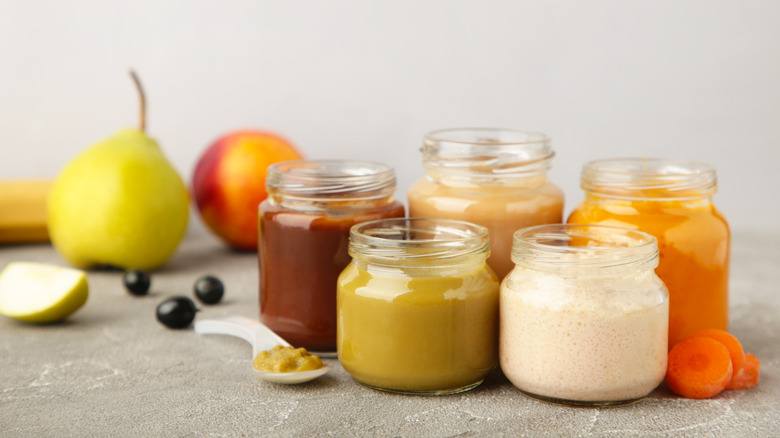Reports Find Heavy Metals Are Still Being Found In Many Baby Foods
Manufacturers of baby food have a crucial responsibility to use safe, wholesome ingredients in their products. And while these manufacturers are subject to strict rules and oversight, Consumer Reports has found that many brands of baby food still contain high levels of heavy metals like cadmium, lead, and arsenic. These metals can leech into foods, such as root vegetables and rice, when they're found in the soil surrounding crops. As a result, it's not entirely possible to keep them out of baby food when certain ingredients are used. Accordingly, parents should be conscientious of heavy metal levels but refrain from panicking.
In 2018, Consumer Reports tested 14 products intended for babies and toddlers to determine their heavy metal concentration. Recent testing included seven of those original products, as well as seven products that were similar to ones that were previously tested but are no longer on the market. Levels did decrease in certain products, but others showed a reduction in some heavy metals and an increase in others. Foods with especially high levels should be provided to children sparingly, with Consumer Reports recommending that kids receive less than half a serving of specific foods each day.
Why heavy metals are problematic and how baby food can be made safer
The reason why toxic heavy metal exposure is such a concern for parents is because these substances can cause harm during a child's developmental stage. Additionally, kids are exposed to heavy metals in a variety of foods, including meals and snack items. Even when products only contain trace amounts, these small amounts can build up and contribute to issues after long-term exposure.
Fortunately, there are lots of strategies parents can use to ensure their child is safeguarded against possible risks. In addition to following the serving recommendations provided by Consumer Reports regarding specific products, parents should also provide a varied selection of foods to their children. This should include foods known to be low in heavy metals, such as non-rice whole grains, fruit, and yogurt.
Manufacturers are also encouraged to assess growing practices to limit the leeching of heavy metals into certain foods. This can entail growing crops in areas known for having soil with low metal levels or utilizing growing practices that limit exposure.
Speaking to CBS News, UC San Francisco professor of reproductive studies Dr. Tracy Woodruff didn't mince words about the Consumer Reports results. "The study shows baby food in general is safe," she said.

